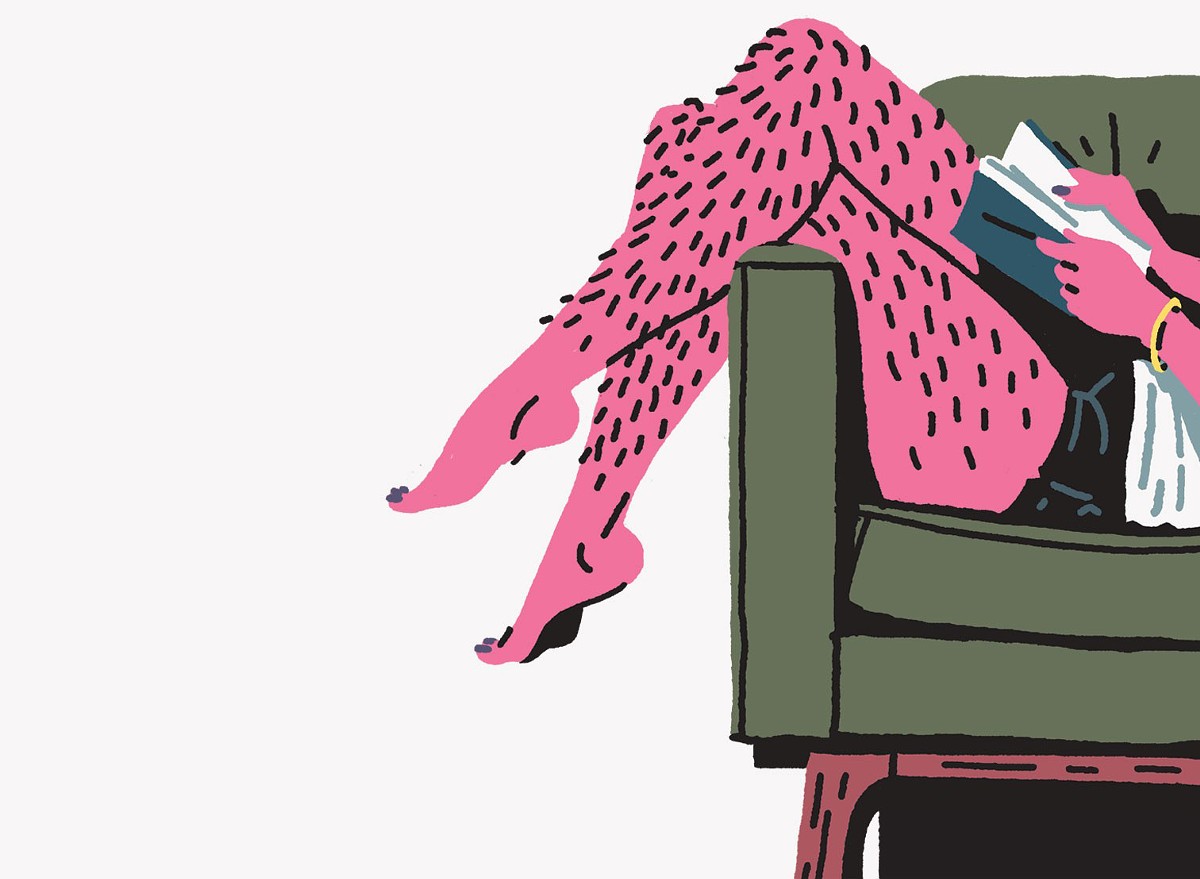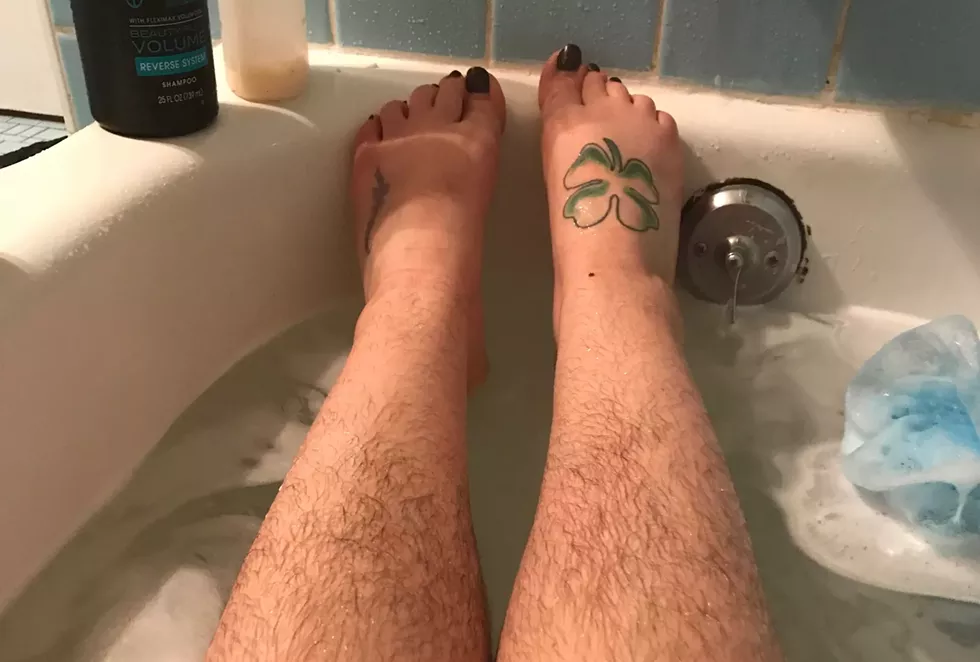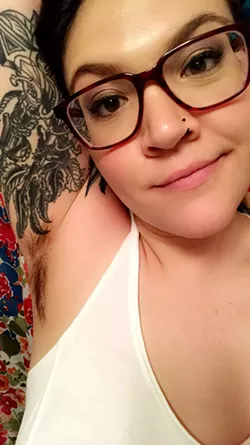I was standing on my front porch in a pair of shorts. My mother had shown up unannounced, which is not unusual, and was telling me some story. But then she looked at my legs, and my face went hot. "I haven't shaved in a while," I said, trying to beat her to the punch.
The corners of her mouth inverted. "That's disgusting," she said. I asked why, but I didn't get a discernable answer. She ended the conversation by saying, "That's OK. You can be that way."
By "that way," I assume she meant "filthy liberal."
About six months earlier, I had pitched an idea to my at-the-time editor — I'd go a year without shaving, and write a personal essay about the experience. She seemed genuinely pleased with the idea, and I was pleased with myself.
Perhaps it was prematurely so.
About a month after making the pitch, my husband and I were watching TV in bed, probably The Voice or something equally terrible. I cuddled up to him, but he recoiled when my prickly legs brushed against him.
"When are you going to shave?" he demanded to know.
I hadn't told him yet. Honestly, I was nervous to. And given his visceral reaction when I declared my intentions, I think my trepidation was vindicated.
He curled up in a ball and cried, "No, no, no, no, no!"
I won't go into detail about the many less-than-kind comments he then spewed, but he did tell me several times that he is not attracted to men.
A month or so later I was sitting on the second floor of Detroit's Urban Bean Co. with a local artist who I was interviewing in advance of her first solo exhibit.
During the interview she looked me in the eye and said, so earnestly, "I don't wear makeup and I wish other women didn't either." At that moment, I was wearing at least 12 different cosmetics on my face.
I was taken aback at the very direct criticism of my tendency to adhere to societal standards. I've always loved makeup. I vividly remember my first eyeshadow purchase: a bright blue shade bought from the Claire's store in my local mall. I'm sure it made me look like Miss Piggy, but damn did I feel beautiful. So grown up!
I recouped pretty quickly though, and pulled up my pant leg. "I don't shave my legs," I told her, and she gave me a chin-raise of approval and the interview carried on.
I don't remember the first time I shaved my legs, but I was probably around 12, maybe 11. I got my period around the same time — a terrifying incident during which I was sure I had somehow unknowingly shat myself. My mother had forbade me from using tampons or a razor, but the hell if I was going to listen to her.
At one point, I shaved everything from the shoulders down. It wasn't until I overheard my classmates deriding an older sister for shaving her forearms that I realized you're just supposed to hone in on certain areas.
I don't remember why I felt an overwhelming compulsion to shave, other than it was a thing you did when you grew up. I'm pretty sure I knew what sex was but really had no idea how it worked, logistically speaking, and I wouldn't have a boyfriend for at least four more years.
My point is there was no pressure from anyone in particular to shave, but I didn't just come up with the idea on my own. Merely existing in society had trained me to believe this was just a thing women did. This is what you do, like wearing pajamas to bed and brushing your teeth in the morning. At the time it didn't seem so much like a burden as it did a privilege — a rite of passage into the fabled world of adulthood.
As ingrained and ubiquitous as the practice is (not just in America, but across the globe), the phenomenon of removing female body hair only really began a few generations ago. In fact, your great-grandmother probably didn't shave her legs.
According to an article titled "Caucasian female body hair and American culture" published in the Journal of American Culture in 1982, the trend began around 1915. Of course, this is all a little less than scientific. The author, Christine Hope, collected her data based on advertisements in Harper's Bazaar and McCall's, two publications that represented the upper and middle classes, respectively.
The early 20th century was a time of beauty evolution. Fashion was changing and soon the iconic flapper style would come into vogue — and with it the removal of underarm hair. Not surprisingly, the assault on leg hair followed soon afterward — and by the 1940s, Hope says, a "tanned, shapely, hairless leg was a thing of beauty."
Mind you, this whole phenomenon appeared to be pushed largely by advertisements — Hope found only a few editorial mentions of body hair removal in these magazines.
Not surprisingly, these ads spun the idea of female body hair as uncleanly as well as unsightly, perpetuating the notion that a woman's body hair was dirty — while men's body hair was left out of the conversation entirely.
Of course, body hair removal is a trend that has ebbed and flowed since humans were still living in caves. Archeological evidence suggests that Neanderthals shaved with clam shells and rough-hewn tweezer made from flint stones. They likely did this as a preventative measure, as wet hair against the skin accelerated the spread of frostbite. In ancient Egypt, people equated hairlessness with cleanliness, but this applied to men, women, and children — many shaved to the point of complete hairlessness. The absurdity of it all was that they would also wear wigs and fake beards in order to protect their skin and signify class superiority.
So the only thing really unprecedented about this new, American era of body hair removal is that it's entirely sexist.
A day or so after I broke the news to my husband, he was still pouting about the whole thing. That evening we were standing in the kitchen and he insisted on learning the details of the deal I had made — was this an assignment? Did I pitch it? Why would I agree to this? Why?
Geez, you'd think this was his body I was experimenting on.
I conjured some contemplative statement — something about how we need to challenge the standards society sets forth, yadda yadda yadda.
That seemed to shake something loose in him and he smiled and whined, "But it's haaaaaard."
The winter months passed easily. Living in Michigan, we perfect the art of layering clothing, and I dress pretty modestly: From late November through May I'm usually covered from the chin down. During that time, I had hardly any occasion to worry someone might spot my furry armpits or legs.
Then came spring, when my mother ambushed me on the front porch.
By then, my leg hair was in its full, bushy glory. Dark and wiry, it grew in thick between my knees and ankles. I was really surprised how much sprang up on my actual knee, but that it was largely invisible on my thighs. I found myself looking at other people's legs — it was a warm spring and people were wearing shorts regularly. I compared my crop to theirs. Most surprisingly, I noticed my father had almost no hair on his legs — a direct contrast to my husband, who has noticeable body hair even on the tops of his feet.
By that time, I was becoming more comfortable with the furriness. I'd walk the dog, go to yoga, and shop for groceries while wearing shorts and a tank top. If people noticed, they mostly didn't let on — although I did catch a woman dressed in nurse's scrubs staring at my legs at Trader Joe's once.
That was the most uncomfortable part, really. My body hair had become this elephant in the room that no one would mention unless I brought it up first. My mother-in-law, who regularly saw me wearing shorts, never once asked what the hell was going on. I even asked my husband if she had perhaps privately inquired about why my legs were so hairy, but he said she never asked him anything.
That doesn't mean no one was saying anything about it. In fact, I had one particularly supportive friend who acted as my mole — reporting back to me what people said about it when I was out of earshot.
Her husband's reaction was similar to my husband's — a vitriolic rant about how repulsive my leg hair looked peeking out of my pant legs. This made absolutely no sense to me. Here was a man — who I have zero percent likelihood of ever having a sexual relationship with — who had an obviously visceral opinion about my appearance, and was not shy about sharing it.
Perhaps without even realizing it, men seem to think women are just supposed to live in a state of appeasing them with our physical appearance. They generally prefer long hair — a fertility signifier — and a smooth, hairless body that denotes youthfulness.
Hope's article doesn't leave this important bit about body hair removal out. In fact, she cites a study in which people were asked to describe images of adult men and women. For the most part, people described photographs of men as "very dominant," "very independent," and "very objective," while women were described conversely — "very subjective," "very dependent, "and not at all independent."
She describes this phenomenon as the "tendency to think of adults as male and to lump women with non-adults" and thus, "Caucasian American women [are] supposed to manifest non-adult personality characteristic, [and] they also are expected to get rid of certain bodily signs of adulthood" — namely, body hair.
If you think I'm starting to sound like a man-hater, feel free to call it like you see it. I am married to a man who is largely wonderful — no matter how well he played the role of villain in this particular essay — and I have a son who I hope grows up to have a consequential understanding of consent, intersectional feminism, and equality.
However, the fact remains that men play a huge role in perpetuating this unrealistic beauty standard. Most women, around the world, give in to their demands daily.
The pressure to conform was, at times, immense. In 11 months I never saw another woman with fully grown body hair.
tweet this
Sure, plenty of women will think, "I like shaving. I love having smooth legs." And I get that. I was really frustrated with my own feelings of hideousness during this whole experiment, and the closer Shave Day got, the more excited I became. I started collecting materials — a special (and expensive!) shave oil, pretty razors, and an electric trimmer made especially for women (meaning, it's pink). I made some delicious smelling body scrub out of sugar and pumpkin pie spice and eagerly waited for the day to come.
And truthfully, I didn't even make it a whole year. I made it 11 months to the day.
I gave up because it began to feel futile and self-centered. In the face of a stream of tragedies in the news (including the largest mass shooting in modern U.S. history), in the face of a world that seems on the brink of cataclysmic change, it started to feel like maybe this one, familiar activity would bring me comfort.
On a Wednesday night, after putting my son to bed, I retreated into my 1950s-style blue-tiled bathroom and began what would be an hour-long procedure. I had imagined that I would emerge like Venus being born from the sea in all of her feminine glory.
Instead, I felt like I'd just been prepped for an operation. The whole thing felt so clinical, like a sterilization. When it was done I still looked like me, but with a lot of knicks where my body hair used to be.
That night, I waited on the couch for my husband to get home from school. I wore a pair of shorts and draped myself longways across our sectional. When he got home he looked at me, annoyed, and waited for me to move so he could sit down too.
He didn't notice my legs for five days.
In the first week or two I shaved during every shower, hoping to keep up the hairless illusion — despite the fact that the cat was long out of the bag — but I have become more lazy now. My armpit hair is growing back a bit and I find myself OK with it.
I will say, pedicures have become vastly less embarrassing, and I don't worry about the yoga assistant accidentally touching my pit hair while adjusting me. I never noticed the feeling of anxiety I had about people spotting my body hair until it was gone. But now that it is, I'm just as responsible as every other woman for complying with this misogynistic beauty standard that seeks to rob us of our adulthood.
The pressure to conform was, at times, immense. In 11 months I never saw another woman with fully grown body hair. It was hard to feel so "other" and there were times when I felt outright embarrassed by my natural body. I never attained any sort of body image enlightenment. I was just me, complete with all of my other bodily flaws, but a version that society found even less attractive.
So, regardless of his self-serving whininess, my husband was right. It is hard.








